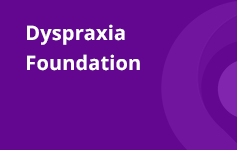Dyspraxia Foundation
Dyspraxia is a lifelong condition affecting gross and fine motor coordination in adults and children. Many may experience difficulties with organisational skills, memory, processing speed and, in some cases, speech.
The Dyspraxia Foundation is committed to making the teaching and medical professions more aware of dyspraxia; and to spread understanding of how those who have the condition can be helped. The Foundation seeks every opportunity to increase understanding of Dyspraxia.
Contacts details
SG5 1EG
Dyspraxia (also known as developmental coordination disorder, or DCD) is a surprisingly common condition affecting movement and coordination in children and adults. It is a hidden condition that is still poorly understood.
Dyspraxia affects all areas of life, making it difficult for people to carry out activities that others take for granted. Signs of dyspraxia/DCD are present from a young age but may not be recognised until a child starts school - or even later in adulthood.
The Dyspraxia Foundation is committed to making the teaching and medical professions more aware of dyspraxia and to spreading understanding of how those who have the condition can be helped.
Dyspraxia, also known as Developmental Coordination Disorder (DCD), is more common than you might think. It's a condition that impacts movement and coordination in both children and adults, but it's often a hidden struggle. Unfortunately, dyspraxia is still not fully understood by many, which makes it even more challenging for those who live with it.
How does dyspraxia affect daily life?
Living with dyspraxia can feel like navigating a world that isn't quite designed for you. It can impact almost every area of life, making everyday tasks that seem simple for others feel incredibly difficult. Think about activities most of us take for granted, things like:
- Physical skills: Tying shoelaces, writing neatly, catching a ball, or riding a bike can be a major hurdle.
- Organisation: Planning, sequencing tasks, and keeping things tidy can feel overwhelming.
- Motor skills: Fine motor skills (using small muscles like in the hand) and gross motor skills (using big muscles for running) can be impacted.
- Timekeeping: Being on time can be hard for those with dyspraxia.
- Learning and memory: These can also be impacted by dyspraxia, making school or work a real challenge.
- Self-care: Sometimes things like getting dressed and hygiene activities can be more of an issue than you might think.
These are just a few examples, but the challenges people with dyspraxia face are incredibly diverse. The symptoms can vary greatly from person to person, meaning that there's no one-size-fits-all experience.
Early signs and recognition
Interestingly, the signs of dyspraxia or DCD often appear early in life, but they might not be recognised until a child starts school. Sometimes, they might not be noticed until much later, even into adulthood. This is why early recognition and support are vital.
Here are some signs you might notice:
| In children | In adults |
|---|---|
| Difficulty learning to walk or crawl | Challenges with driving or using public transport |
| Struggles to use cutlery | Difficulty with DIY projects |
| Problems with dressing themselves | Organisation struggles at work |
| Poor handwriting | Struggles with planning and time management |
| Difficulty participating in sports and PE | Challenges with some cooking techniques |
| Clumsiness and frequent falls | Difficulties with hobbies and leisure activities. |
What's being done to help?
The Dyspraxia Foundation is making a real difference. They're deeply committed to:
- Raising awareness: The foundation is working hard to increase understanding of dyspraxia among teachers and medical professionals. This will help to foster a more supportive community here in Plymouth and beyond.
- Spreading knowledge: They are on a mission to educate the community about what dyspraxia is, how it affects people, and what strategies can really help.
- Providing support: The Dyspraxia Foundation aims to provide support, guidance, and resources to help those with dyspraxia live full and productive lives. They recognise the unique challenges and are advocating for personalised care and understanding.
Is the information correct?
Let us know if the information on this page is wrong and needs to be updated.
Want to create a page on the Plymouth Online Directory? Register for free and add a page; it only takes a few minutes.
- Everyone, regardless of age
- Physical disabilities
Back to search





